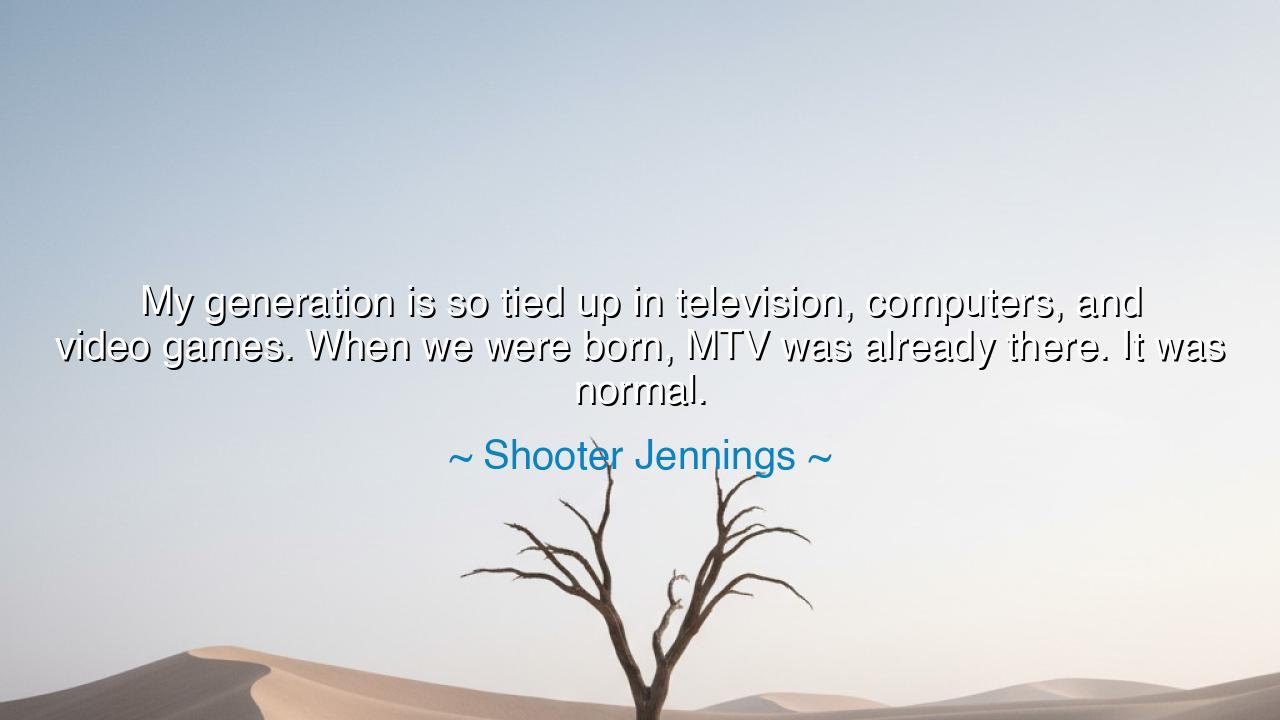
My generation is so tied up in television, computers, and video
My generation is so tied up in television, computers, and video games. When we were born, MTV was already there. It was normal.






“My generation is so tied up in television, computers, and video games. When we were born, MTV was already there. It was normal.” – Shooter Jennings
In these words, Shooter Jennings, the son of country legends and a musician in his own right, speaks not as an artist alone, but as a philosopher of his age. His statement is a lament and an observation—a reflection on the world into which his generation was born, a world illuminated not by the light of the sun or the fire of imagination, but by the cold glow of screens. When he says that MTV was already there, he is pointing to a truth deeper than nostalgia: that his generation did not witness the arrival of technology—it was born into its embrace, cradled by it, shaped by it. What had once been innovation became instinct. What was once wonder became normal.
The origin of this quote lies in the transition between two great epochs of humanity—the analog and the digital. Jennings was born in the late 1970s, at a time when the world’s pulse began to sync with the rhythm of machines. Television had conquered the hearth, computers were whispering their first promises of a new frontier, and video games had begun to turn imagination into pixels. To his parents’ generation, these things were miracles; to his, they were air and water. Thus, his words carry both awe and melancholy—the recognition that while his generation was richer in access to images and sounds than any before, it was also poorer in mystery.
In ancient times, stories were carried by the voice and the fire. The elders spoke, and the young listened—not to images, but to words that painted pictures in the soul. There were no screens to distract, no digital noise to scatter the attention. Each tale was a bridge between hearts, a living thread connecting wisdom to wonder. But in Jennings’s time, and in ours, that sacred space of silence and imagination has been replaced by the constant hum of technology. The television, the computer, and the video game console have become the new storytellers—brilliant, dazzling, but often hollow, their songs too loud to leave room for reflection.
Yet Jennings does not condemn his generation; he speaks as one who understands its captivity. “It was normal,” he says—and therein lies the tragedy. When a new way of living becomes normal, it becomes invisible. His words echo like the warning of a prophet: beware of what you grow accustomed to, for familiarity is the greatest sedative of the spirit. The danger is not in the tools themselves, but in their power to lull us into forgetting that life exists beyond them. To be tied up in technology is to risk being tangled in illusion—to mistake the flicker of the screen for the fire of reality.
There is an ancient story of Narcissus, the youth who fell in love with his own reflection in the still water. Unable to look away, he perished by the very image that enchanted him. Jennings’s generation, and ours, face the same temptation. The screens that surround us are pools of reflection—mirrors that show us endless images of ourselves and others, yet draw us away from the living world. The tragedy of Narcissus was not vanity—it was disconnection. He forgot the river’s depth while gazing upon its surface. So too, we risk forgetting the depth of our own humanity while swimming in the shallows of digital illusion.
And yet, the quote carries a spark of redemption. Jennings speaks with awareness, and awareness is the first step toward freedom. To see one’s own generation clearly is to hold the key to its healing. He reminds us that we must remember what is real—the sound of a live instrument, the warmth of a conversation, the silence of the stars. The tools of his generation—television, computers, video games—need not be our prison; they can be our instruments if used with purpose and restraint. The challenge is not to reject them, but to master them, to let them serve life rather than dominate it.
Thus, the lesson stands as timeless as any wisdom from the ancients: do not mistake what is normal for what is natural. The soul of humanity was not born in the glow of a screen, but in the rhythm of the heart, the laughter of gatherings, and the music of creation. Technology can amplify these things, but it can never replace them. Therefore, walk wisely amid the wonders of your age. Look up from the screen. Seek moments of stillness. Play, not only with machines, but with life itself. For as Jennings reminds us, the danger of being born into a world of constant noise is forgetting that true song comes from within.
So let this be passed down as teaching: the world will always change, but the essence of being alive does not. Use the tools of your time, but do not let them use you. Create, connect, and remember that the brightest light is not that of a pixel—it is the one that burns within the human heart.






AAdministratorAdministrator
Welcome, honored guests. Please leave a comment, we will respond soon